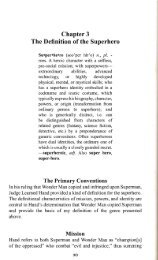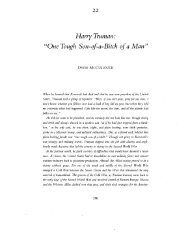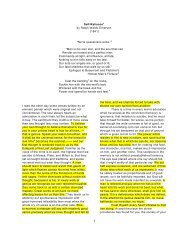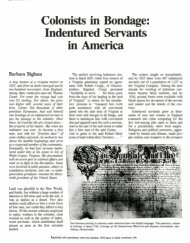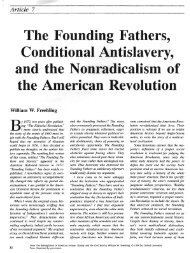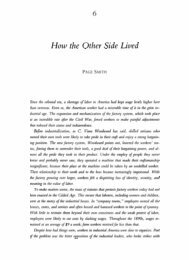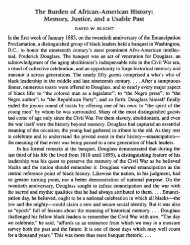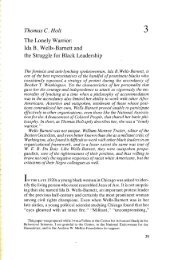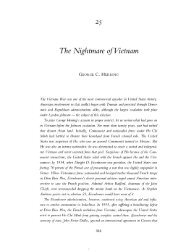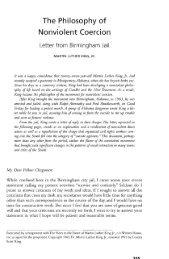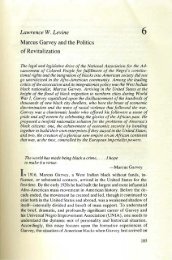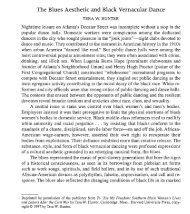Mary - Journeytohistory
Mary - Journeytohistory
Mary - Journeytohistory
You also want an ePaper? Increase the reach of your titles
YUMPU automatically turns print PDFs into web optimized ePapers that Google loves.
Chapter 13 Losing the Peace 2 7sentiment was strong for constitutional revision; a convention met in 1890 forthe primary purpose of disfranchising blacks. A suffrage amendment was writtenthat imposed a poll ta..'{ of $2 and excluded voters convicted of bribery, burglary,theft, arson, perjury, murder, or bigamy. These amendments also barredall who could not read any section of the state constitution, orPassage of Sll ffrngeunderstand it when read, or give a reasonable interpretation ofamendmentui franchisillgblne)is inMi'sissippiit. Isaiah T. Montgomery, the only black delegate to the convention, said that the poll tax and education reqUirementswould disfranchise 123,000 blacks and only 12,000 whites. Henevertheless supported the proposed amendments, presumablyknowing the devastating effect they would have on the blacl{ vote. Beforethe convention, black delegates from forty counties had met and protestedtheir impending disfranchisement to President Harrison. Doubtless they wouldhave fought ratification, but the Conservatives would run no risk of haVingtheir handiwork rejected; after the convention approved the constitution, itwas promulgated and declared to be in effect.South Carolina followed Mississippi by disfranchising blacks in 1895. BenTillman had worked toward this goal after he was elected governor in 1890, buthe was unable to obtain sufficient support for a constitutional convention untilBen '/iUUIlUl :lIlU 1894. Tillman was at that time in the U. S. Senate, but he retheCOlllmittee ou turned to the convention to serve as chairman of the Commit-Rights amI tee on Rights of Suffrage and thus to be certain that blacksSuffmge were effectively disfranchised. The clause, when adopted,called for two years' residence; a poll ta..'{ of $1; the ability to read and write anysection of the constitution or to understand it when read aloud, or the owningof property worth $300, and the disqualification of convicts.Black delegates bitterly denounced this sweeping disfranchisement. In answerto Tillman's charge that blacks had done nothing to demonstrate their capacityin government, Thomas E. Miller replied that they were largelyresponsible for "the laws relative to finance, the building of penal and charitableinstitutions, and, greatest of all, the establishment of the public school system."He declared that numerous reform laws "touching every department ofstate, county, municipal and town governments. . stand as living witnesses[on the statute books of South Carolina] of the Negro's fitness to vote and legislateon the rights of mankind." James Wigg of Beaufort County said,The Negro ... has a right to demand that in accordance with his wealth,his intelligence and his services to the state he be accorded an equal andexact share in its government. ... You charge that the Negro istoo ignorant to be trusted with the suffrage. I answer that youhave not, nor dare you, make a purely educational test of theright to vote. You say that he is a figurehead, an encumbranceBlad, delegate.'prote~ t agRinstuisj'nlllcllisingblacl"s ill SOllthCal'O)inato the state, that he pays little or no taxes. I answer you, youhave not, nor dare you make a purely property test of the rightto vote.... We submit our cause to the judgment of an enlightened publicopinion and to the arbitrament of a Christian civilization.



